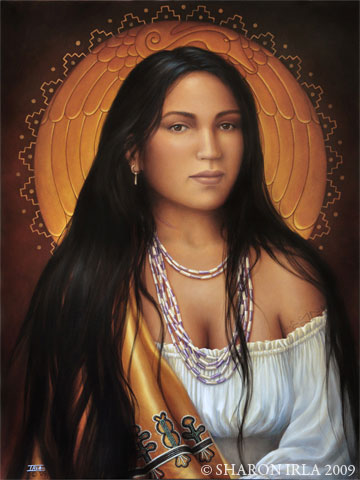 Nanye-hi was born in 1738. She was the daughter of Tame Doe, a member of the Wolf Clan and sister to Attakullakulla. She married Kingfisher and had two children by him. Nanye-hi accompanied her husband on a raid of the Creeks during the Battle of Taliwa in 1755. Kingfisher was killed in the battle and Nanye-hi filled his place in the battle. She took his rifle and rallied the warriors to victory.
Nanye-hi was born in 1738. She was the daughter of Tame Doe, a member of the Wolf Clan and sister to Attakullakulla. She married Kingfisher and had two children by him. Nanye-hi accompanied her husband on a raid of the Creeks during the Battle of Taliwa in 1755. Kingfisher was killed in the battle and Nanye-hi filled his place in the battle. She took his rifle and rallied the warriors to victory.
For her bravery she was bestowed with the title of Ghigua. The Ghigua, or Beloved Woman of the Cherokee, was a prestigious title given to extraordinary women by the Cherokee clans. The Ghigua headed the Council of Women and held a voting seat in the Council of Chiefs. The Ghigua was given the responsibility of prisoners and would decide their fate.
Nanye-hi, or Nancy, married a second time, this time to a white man. Bryant Ward, a trader who took up residence within the Cherokee Nation, married Nancy in the late 1750s. The two had a daughter before Bryant returned to South Carolina to live with his white family. Nancy and her daughter would often visit Bryant Ward and his family; they were always treated well.
Nancy Ward was a respected woman among the Cherokees and the white settlers. She was an outspoken supporter of peace. On at least two occasions she sent warnings to white settlements of impending Indian attacks, for fear that surprise attacks would further erode the strained relationship between the Cherokees and the settlers.
She participated in several treaty negotiations and even spoke at the Treaty of Hopewell in 1785 where she spoke about her hopes for a continued peace.
Sadly, Nancy would live to see dramatic developments which would forever change the Cherokee Nation. Numerous treaties that agreed to honor Cherokee land rights were broken. In 1819 the Hiwassee Purchases forced Nancy to abandon her home in Chota and settle further south on the Ocoee River.
Nancy’s efforts for peace did help to avoid large-scale war with the white settlers, but in the end nothing could protect the Cherokee Nation from white encroachment. Nancy died in 1822 and is buried near Benton, Tennessee. Less than a decade later the Indian Removal Act was passed, and by 1838 a forced removal to Indian Territory in present day Oklahoma was taking place.
Nancy Ward was the last Ghigua. The Cherokee government changed dramatically during Nancy’s lifetime and the Cherokee, once ruled by clan loyalty, were moving toward a republican form of government. There was no longer a place in their government for a Ghigua.
Art Credit
The painting above is a work by Cherokee artist Sharon Irla called, “Beloved Woman of the Cherokee – Nanyehi.” This work is available at All Things Cherokee Art Gallery: Sharon Irla.